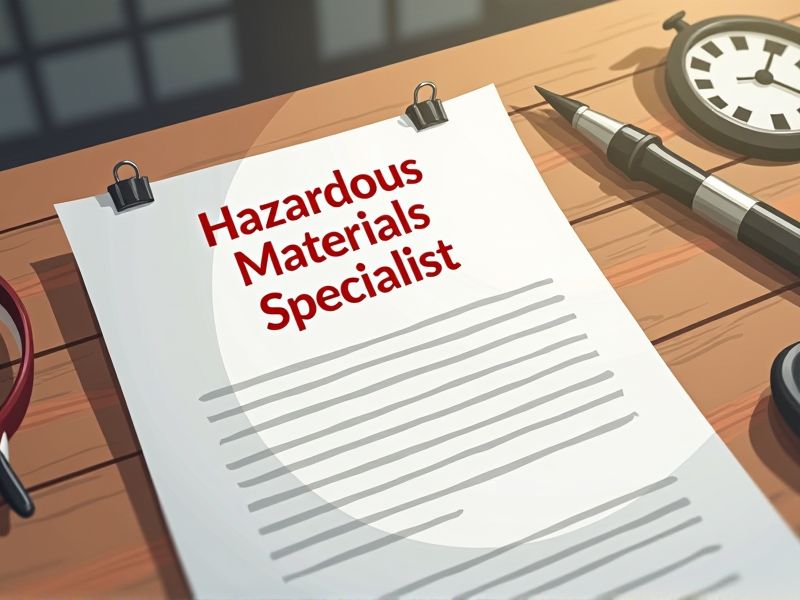
Hazardous Materials Removal Specialists deal with dangerous substances, necessitating stringent safety protocols to prevent health risks. Certifications validate their competence in handling and disposing of toxic materials safely. These credentials also ensure adherence to government regulations and industry standards. Key certifications essential for Hazardous Materials Removal Specialists include the following.
OSHA Hazardous Waste Operations and Emergency Response (HAZWOPER) Certification
The OSHA HAZWOPER Certification ensures that Hazardous Materials Removal Specialists are trained to handle potentially dangerous situations, reducing the risk of injuries and illnesses. Proper certification improves compliance with federal regulations, avoiding costly fines and legal issues for employers. Training equips specialists with knowledge to effectively manage hazardous substances, leading to safer work environments. Certified specialists enhance public safety by ensuring hazardous waste is contained and disposed of properly.
OSHA 40-Hour HAZWOPER Training Certification
1. OSHA's 40-Hour HAZWOPER training certification is mandatory because it equips Hazardous Materials Removal Specialists with the necessary skills and knowledge to handle dangerous substances safely. 2. This certification is crucial, as it teaches specialists to recognize and manage potential risks in hazardous environments, mitigating health and safety dangers. 3. Compliance with this training requirement reduces the risk of occupational injuries and illnesses, aligning with federal and state regulations for workplace safety. 4. Employers demand this certification to ensure that their employees are competent and legally certified to work with and remove hazardous materials effectively.
OSHA 24-Hour HAZWOPER Refresher Certification
The OSHA 24-Hour HAZWOPER Refresher Certification ensures that Hazardous Materials Removal Specialists remain current on safety protocols, thereby reducing accident risks. Regular updating of safety knowledge minimizes the chance of regulatory non-compliance, which can lead to fines and legal issues. Continuous education in hazardous materials management prevents skill decay, maintaining effective handling practices. Certification renewal reinforces a commitment to safety, enhancing team trust and organizational credibility.
EPA Hazardous Materials Response Certification
Possessing the EPA Hazardous Materials Response Certification increases the credibility and trustworthiness of a Hazardous Materials Removal Specialist. The certification ensures that specialists are knowledgeable about federal regulations and safe practices, reducing the risk of legal and environmental liabilities. It enhances the ability to effectively manage and mitigate hazardous material incidents, safeguarding public health and the environment. Employers and regulatory bodies often require this certification as a validation of skills and expertise in handling hazardous substances.
Department of Transportation (DOT) Hazardous Materials Endorsement
The Department of Transportation (DOT) Hazardous Materials Endorsement ensures a Hazardous Materials Removal Specialist is knowledgeable about safe handling and transportation of dangerous substances. This endorsement is crucial because it reduces the risk of accidents and environmental harm during transit. Regulatory compliance with DOT standards is mandatory for specialists to legally transport hazardous materials. It provides assurance to employers and the public that specialists are fully trained in safety procedures.
Asbestos Abatement Certification
Asbestos Abatement Certification ensures that a specialist has the necessary knowledge to handle asbestos safely, reducing health risks associated with exposure. Regulatory agencies require certified professionals to ensure compliance with safety standards during asbestos removal projects. Without proper certification, specialists may inadvertently release asbestos fibers, posing environmental and health hazards. Certification provides assurance to employers and clients about a specialist's proficiency and commitment to adhering to best practices.
Lead Abatement/Remediation Certification
Lead abatement/remediation certification is essential for hazardous materials removal specialists because it equips them with the necessary knowledge to safely eliminate lead-based risks. This certification ensures compliance with federal and state safety regulations designed to protect public health from lead exposure. Without proper certification, specialists may inadvertently expose themselves and others to hazardous conditions. Certified professionals are more likely to perform efficient and effective lead remediation, reducing potential health risks in affected communities.
Certified Hazardous Materials Manager (CHMM)
A Certified Hazardous Materials Manager (CHMM) ensures compliance with regulations, which minimizes the risk of legal penalties during hazardous materials removal. Their expertise in risk assessment enhances safety protocols, reducing potential health hazards. CHMMs implement efficient waste management strategies, leading to cost-effective operations. Knowledge of environmental protection measures helps in preserving ecological integrity during the removal process.
Confined Space Entry Certification
Confined Space Entry Certification is essential because it equips hazardous materials removal specialists with the necessary skills to safely navigate and work in restricted environments where dangerous substances may be present. Without this certification, there is an increased risk of accidents or exposure to harmful materials, as these spaces often have limited ventilation and can contain toxic gases. This certification ensures adherence to safety protocols, reducing liabilities for employers and enhancing worker safety. Regulatory compliance often mandates this certification, reinforcing its importance for legal and operational standards in the field.
Industrial Hygiene Certification
Industrial Hygiene Certification equips specialists with the knowledge to assess and control exposure to hazardous materials, which is crucial for safety. This certification ensures they understand the regulatory compliance and standards that must be met during hazardous material removal. Proper training through certification reduces the risk of health issues and enhances workplace safety. Certification signifies expertise, thereby increasing trust and credibility with employers and clients.
Summary
As a reader, when you become a certified Hazardous Materials Removal Specialist, you gain recognized expertise that can enhance your career opportunities. Such certification often leads to higher earning potential due to your specialized skills. Employers tend to prefer certified specialists, as they indicate a formal commitment to safety and compliance. Consequently, this can lead to more job stability and potential advancement within the industry.
